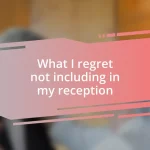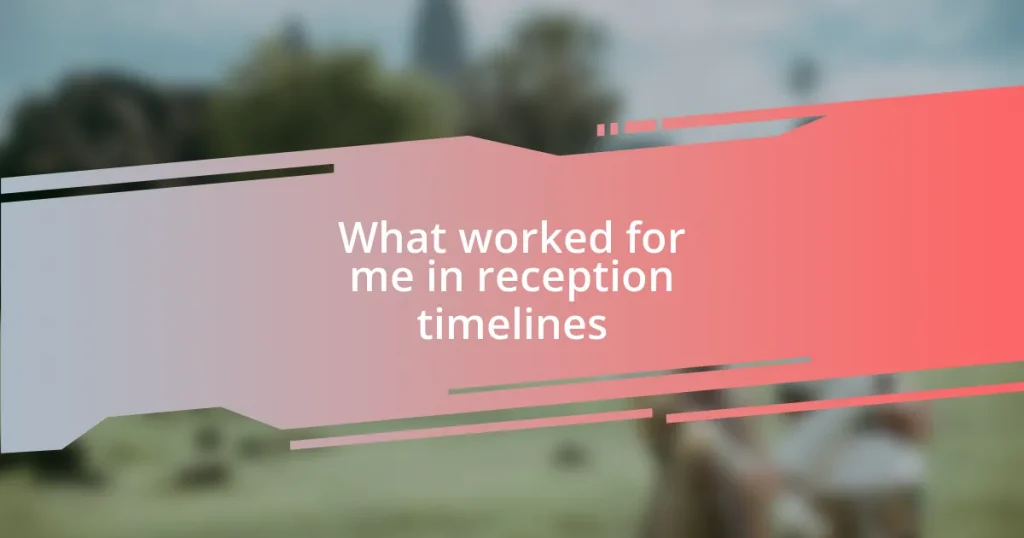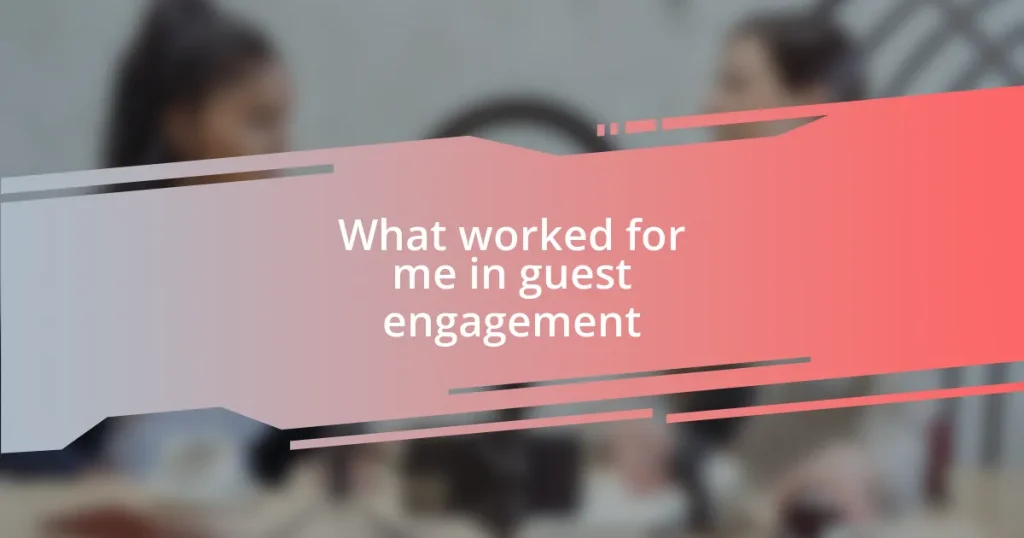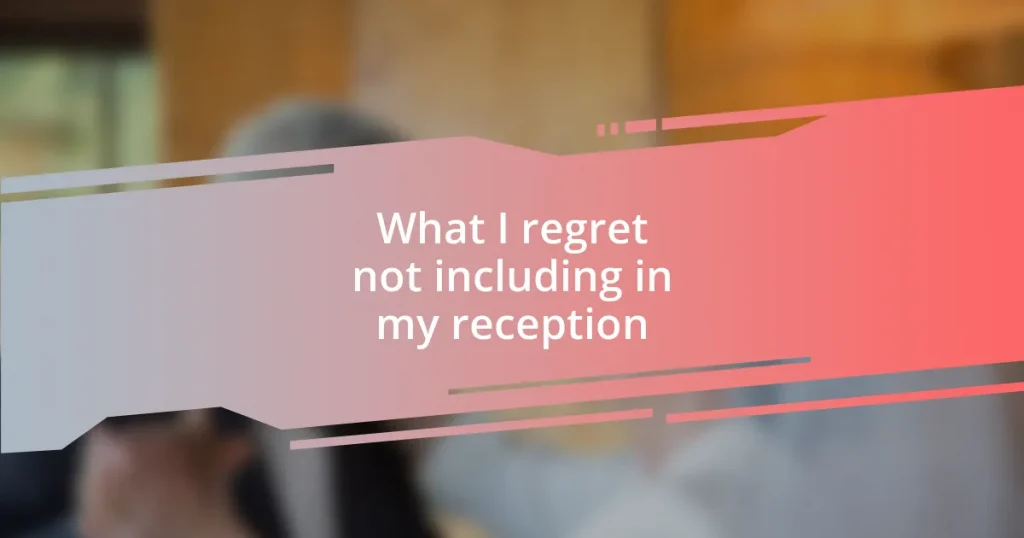Key takeaways:
- Relaxation is vital for well-being, enhancing clarity and emotional health through intentional downtime.
- Identifying preferences for social events helps create fulfilling experiences while maintaining balance with relaxation.
- Creating a color-coded calendar and being flexible with plans ensures a healthy mix of events and downtime.
- Setting boundaries and reflecting on past experiences fosters growth and improves future social engagements.

Understanding the Importance of Relaxation
Relaxation plays a crucial role in our overall well-being, often serving as a reset button for our minds and bodies. I remember feeling completely overwhelmed during one particularly busy week, and taking just an hour to unwind with my favorite book made a world of difference. Have you ever noticed how a little downtime can rejuvenate your spirits and enhance your focus?
In our fast-paced lives, we often underestimate the value of taking a step back. I’ve found that integrating small breaks throughout the day helps prevent burnout and boosts my productivity. After all, isn’t it fascinating how a brief moment of stillness can lead to clearer thoughts and better decision-making?
The emotional release that comes from relaxation is equally important. I recall a time after a stressful event when I spent the evening outdoors, simply breathing in the fresh air. That night reminded me how essential it is to give ourselves the grace to pause and reflect. How does relaxation impact your emotional health? It’s worth considering, as those moments can spark inspiration and creativity we didn’t even know we had!

Identifying Your Event Preferences
When it comes to identifying your event preferences, I’ve noticed it really helps to reflect on past experiences. Think back to the events you’ve attended that brought you joy or exhaustion. I remember a networking event where I thrived in small group discussions but felt drained in larger crowds. Discovering that I prefer intimate settings made it easier for me to choose future gatherings that align with my personality.
To clarify your preferences, consider these guiding questions:
- Do you enjoy socializing in large groups or prefer one-on-one interactions?
- Are formal settings appealing, or do you gravitate towards casual meetups?
- How do you feel after attending an event – invigorated or exhausted?
- Do you prefer events that focus on learning and workshops or those that emphasize socializing and fun?
- What types of activities engage you the most – active participation or passive observation?
Having clear answers can enhance your event experiences and contribute to a balanced life between relaxation and social engagements.

Creating a Balanced Calendar
Creating a balanced calendar is essential for harmonizing relaxation with event participation. I often find myself mapping out my week to ensure I’m not overcommitting to social engagements. Incorporating downtime after events is a strategy that has worked wonders for me. Just last month, after a lively dinner with friends, I scheduled a quiet day at home. That little buffer allowed me to recharge and reflect, making me feel more prepared for the next gathering.
When building your calendar, consider using color-coding for different activities. I use distinct colors for work, relaxation, and events on my planner. This visual representation not only makes it easier to spot potential overload but also ensures I prioritize self-care. For instance, if I see too much blue (for events) creeping into my week, I know it’s time to add some green (for relaxation) to maintain balance.
Lastly, I’ve learned the importance of flexibility in my scheduling. Life is unpredictable, and I recall a week when unexpected plans arose, shifting my entire agenda. Instead of panicking, I adapted by shifting relaxation to the weekend and keeping my week lighter. This way, I could still enjoy spontaneity while ensuring I didn’t sacrifice essential downtime.
| Scheduling Tips | Personal Insights |
|---|---|
| Use a color-coded calendar | Visually assess your time commitments at a glance |
| Add downtime after events | Recharge and reflect from social interactions |
| Be flexible with your plans | Adapt to unexpected changes without compromising self-care |

Strategies for Efficient Time Management
Time management can feel overwhelming, but I’ve found that breaking tasks into smaller, manageable chunks really makes a difference. For instance, when I have a busy week of events, I allocate specific time slots for preparation and relaxation. It’s almost like I’m a chef prepping ingredients before cooking. Have you ever noticed how a well-organized kitchen can lead to a smoother cooking experience? That’s exactly what effective time management does for my days.
Another technique I’ve incorporated is setting specific deadlines for personal tasks. For example, I’ve started giving myself a firm cut-off time for work-related projects, ensuring I don’t encroach on my downtime. I remember a week when I promised myself to finish all my work by 5 PM, allowing my evenings to be completely dedicated to relaxation or social events. How liberating it felt to stick to that promise! It transformed my evenings from frantic work sessions into peaceful moments where I could recharge or enjoy time with friends, proving that clear boundaries can foster a balanced life.
A powerful approach that truly resonates with me is reflecting on my priorities each week. At the start of each week, I sit down for a few minutes to assess what activities light me up versus what feels like a chore. I once found myself booked for three back-to-back events, and let me tell you, I wasn’t excited about any of them. The moment I realigned my week to focus on activities that fueled my passion, my mood shifted. I realized that prioritizing what I genuinely care about not only enriches my schedule but also enhances my overall sense of well-being. Isn’t it amazing how a bit of self-reflection can lead to time well spent?

Incorporating Relaxation into Events
Incorporating relaxation into events has become a crucial part of my overall planning. I remember hosting a gathering last winter, and instead of the usual frantic approach, I designated a cozy corner for guests who wanted a low-key space. It turned out to be a hit! By blending festivities with moments of tranquility, we created an atmosphere that celebrated connection while honoring personal space. Have you ever thought about how simply acknowledging a need for relaxation can enrich your gatherings?
I often suggest planning activities that encourage unwinding during events. One memorable birthday party I attended featured a guided meditation session amidst party games. Initially, some guests were skeptical, but as we settled into the moment, I could see the change in everyone’s demeanor. It transformed the energy from wild chatter to a calm, collective joy. Wasn’t it refreshing? Balancing excitement and relaxation doesn’t just enhance experiences—it creates lasting memories.
Beyond the events themselves, I find that setting the scene can also encourage relaxation. For instance, at a recent outdoor picnic, I brought along soft blankets and calming music. That simple addition fostered an inviting atmosphere where conversations flowed, and laughter echoed under the trees. Many guests commented on how the ambiance made them feel at ease. How often do we overlook the power of our surroundings in creating a balanced event experience?

Setting Boundaries for Better Balance
Establishing boundaries is something I’ve learned to prioritize in creating better balance in my life. A few years ago, I used to say yes to every invitation that came my way, convinced I had to be involved in everything. One weekend, I lined up three different events, and by Sunday night, I felt completely drained. That experience taught me the importance of learning to say no and recognizing my limits. Have you ever pushed yourself beyond what felt right, only to realize later that it wasn’t worth the exhaustion? Setting clear boundaries allows me to protect my downtime for what truly matters.
I also find it beneficial to clearly communicate my availability to friends and family. For example, when I know a hectic week is on the horizon, I send out a quick message letting everyone know that my weekdays are reserved for work and personal recuperation. This transparency has resulted in a greater understanding from those around me, and I’ve noticed that people actually respect my boundaries now. It’s amazing how simply stating my limits can take pressure off and create a smoother flow in my schedule. Have you tried openly sharing when you need time for yourself?
Lastly, I’ve discovered that creating a dedicated relaxation zone at home has become a sanctuary for me. I set aside a cozy nook with soft lighting, my favorite books, and soothing candles. When I enter that space, it signals to my mind that it’s time to unwind. There’s something so powerful about physically creating a boundary that separates busy life from relaxation. Do you have a spot where you can retreat and recharge? It’s a small but impactful practice that reinforces my commitment to maintaining balance in my daily routine.

Reflecting on Your Experiences
Reflecting on experiences is where the real growth happens. I distinctly remember my transition from chaotic planning to a more mindful approach during social events. After feeling overwhelmed at a few gatherings, I began jotting down my thoughts immediately afterward, noting what worked and what didn’t. This reflection helped me understand the importance of blending relaxation into future plans. Have you ever considered how a simple notebook can illuminate patterns in your experiences?
Sometimes, the most meaningful insights come from unexpected moments. During one event, a friend shared how a shared silence felt refreshing amid the noise of small talk. It struck me that these pauses can be delightful, offering space for deeper connections. I started to appreciate not just the festivities but the quiet reflections they prompted. Has a moment ever caught you off guard and made you rethink your approach to social interactions?
I’ve found that reflecting regularly can uncover valuable lessons. After hosting a recent dinner party, I took a quiet evening to review how everything unfolded, from the menu choices to the energy in the room. To my surprise, I realized that my guests appreciated the moments when we simply enjoyed each other’s company, free of distractions. It’s a reminder of how reflection fosters personal growth and enhances future experiences. How often do you pause to think about what truly matters in your gatherings?















